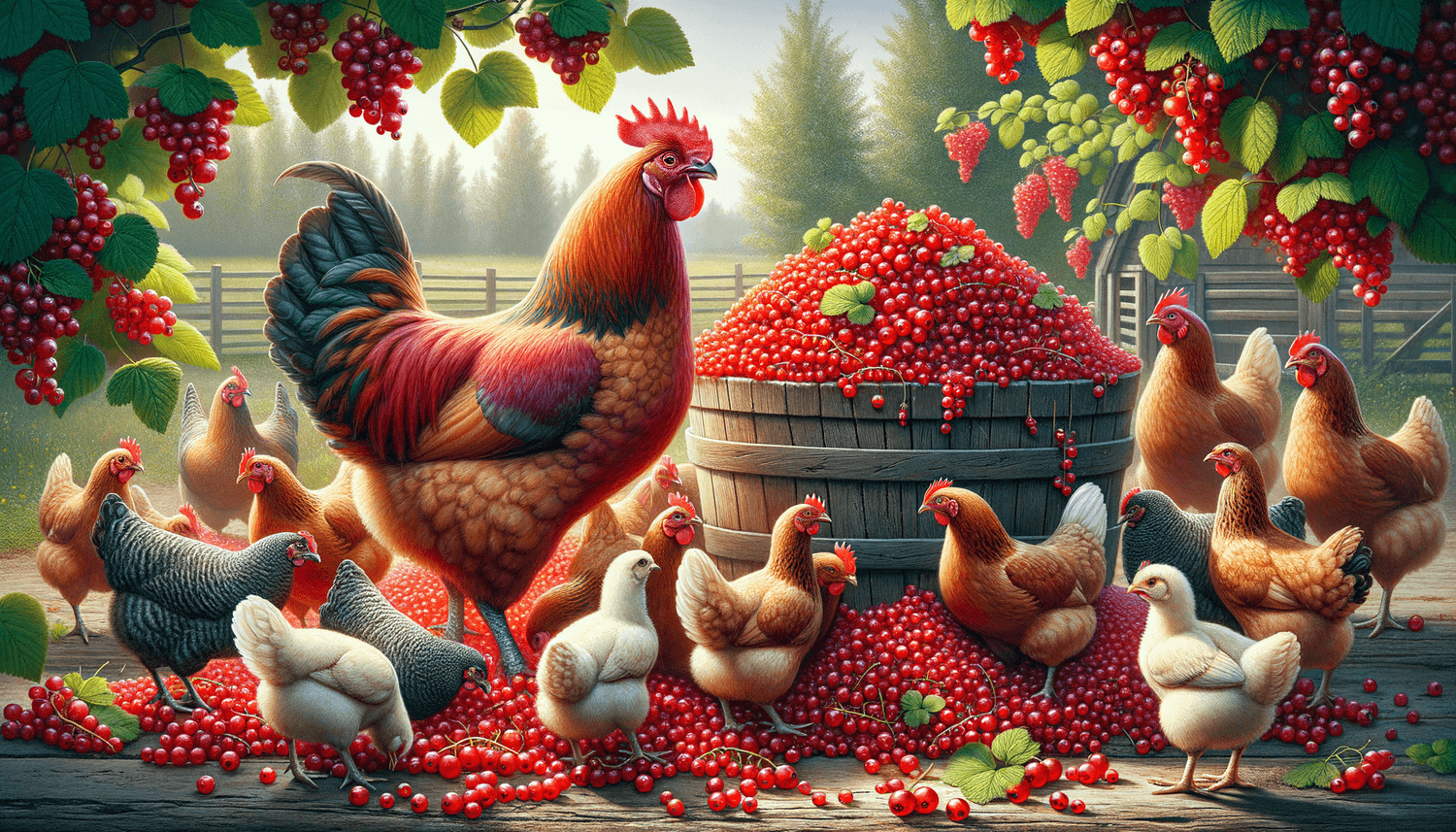As a backyard chicken enthusiast, you’re constantly seeking new treats and delights for your feathered friends, and the vibrant redcurrant has piqued your curiosity – but can chickens eat redcurrants? Fear not, flock masters! We’ve got you covered in this fun blog post, where we’ll explore the possibility of including these tantalizingly tart treats in your chickens’ diet, the need for maintaining a balanced diet, the potential benefits and risks associated with redcurrants, their nutritional value, and even how to prepare these juicy morsels for your clucky companions to enjoy!
Can chickens eat redcurrants?
Yes, chickens can safely eat redcurrants as a treat. Redcurrants are not toxic to chickens and can actually be a valuable source of vitamins and antioxidants. However, it is important to ensure that treats like redcurrants should not exceed 10% of your chickens’ diet in order to maintain their overall health and well-being.
A balanced diet for happy, healthy chickens
Just like humans, our feathered friends need a balanced diet to stay happy and healthy. Chickens have unique dietary requirements that need to be met in order to ensure they maintain their overall health and well-being. This is especially important for those who want to obtain optimal egg production and quality from their laying hens.
A chicken’s diet should primarily consist of a high-quality chicken feed, which should make up around 80-90% of their daily intake. Chicken feed is formulated to provide the proper nutrients, vitamins, and minerals needed for growth, development, and egg production. The remaining 10-20% of their diet can consist of tasty treats like fruits and vegetables. This is where redcurrants and other produce can enhance your chickens’ diet, offering not only delicious flavors, but also an added boost of essential nutrients.
Nutritional value of redcurrants for chickens.
Feeding redcurrants to chickens offers an array of nutritional benefits, thanks to their rich content of vitamins, minerals, and other essential nutrients. One of the main benefits of redcurrants is their high levels of vitamin C, which enhances the immune system and plays a crucial role in cell repair, helping your chickens maintain their overall health.
Apart from vitamin C, redcurrants are also a good source of vitamins B, E, and K, as well as vital minerals such as potassium, magnesium, and calcium. These vitamins and minerals contribute to your chickens’ energy production, bone health, and blood clotting processes. Furthermore, redcurrants are packed with antioxidants, which aid in neutralizing free radicals and protecting the body against oxidative stress.
Another benefit of offering redcurrants to your chickens is their high water content. Hydration is important for chickens, just like it is for us humans. Redcurrants, with their high water content, can act as an extra source of hydration for your chickens, especially during hot summer days when dehydration could become a concern.
Overall, redcurrants are not only safe but also nutritious for your chickens to eat. They provide a variety of vitamins, minerals, antioxidants, and hydration, all of which contribute positively to your chickens’ health when offered as a part of their balanced diet.
Nutrition table of redcurrants for chickens.
| Information | Description |
|---|---|
| Nutritional Value | High in vitamins (C, B, E, K), minerals (potassium, magnesium, calcium), and antioxidants. |
| Suggested Serving Size | Treats should not exceed 10% of your chickens’ diet, so provide a small handful per chicken. |
| Safe Feeding Practices | Wash redcurrants thoroughly, no pesticides, and feed in moderation to avoid dietary imbalances. |
| Preparation | Rinse and serve fresh, preferably on a dish to prevent contact with dirt or feces. |
| Potential Risks | Minor risk of overfeeding leading to dietary imbalance. Always feed in moderation. |
| Hydration | High water content can offer an extra source of hydration during hot weather. |
| Digestion | Redcurrants are easily digestible for chickens when consumed in the appropriate serving size. |
| Seasonal Availability | Summer is the ideal time to find fresh redcurrants, though frozen redcurrants can also be an option. |
| Other Benefits | Supports immune system, energy production, bone health, and blood clotting processes. |
Feeding other berries to your chickens
Redcurrants are not the only berry option that can be safely and beneficially included in your chickens’ diet as a treat. In fact, various other berries, such as strawberries, blueberries, raspberries, and blackberries, can also be provided to your chickens as nutritious snacks. As with redcurrants, these berries are rich in vitamins, minerals, and antioxidants that contribute to your chickens’ overall health. Remember to apply the same safe feeding practices, such as washing the berries thoroughly and providing them in moderation.
Storing and preserving redcurrants
If you want to make the most of the redcurrant season and provide your chickens with these treats throughout the year, you may consider preserving or storing redcurrants properly. Once harvested, fresh redcurrants can be safely stored in a refrigerator for about a week. For longer storage periods, you can freeze the redcurrants. To do this, spread them out on a baking sheet, freeze until solid, and then transfer them to an airtight container or resealable plastic bag. This will ensure that they maintain their nutritional value and can be a valuable source of nutrients in the colder months when fresh produce is not as readily available.
Final thoughts
In conclusion, including redcurrants in your chickens’ diet can be an enjoyable and nutritious treat for your feathery friends. Not only are they safe for consumption, but they also supply essential vitamins, minerals, and antioxidants that can enhance your chickens’ health when offered alongside a balanced diet. Becoming more familiar with the seasonal availability, proper storage techniques, and optimal feeding practices will help ensure you provide the best care possible for your backyard chickens.

















